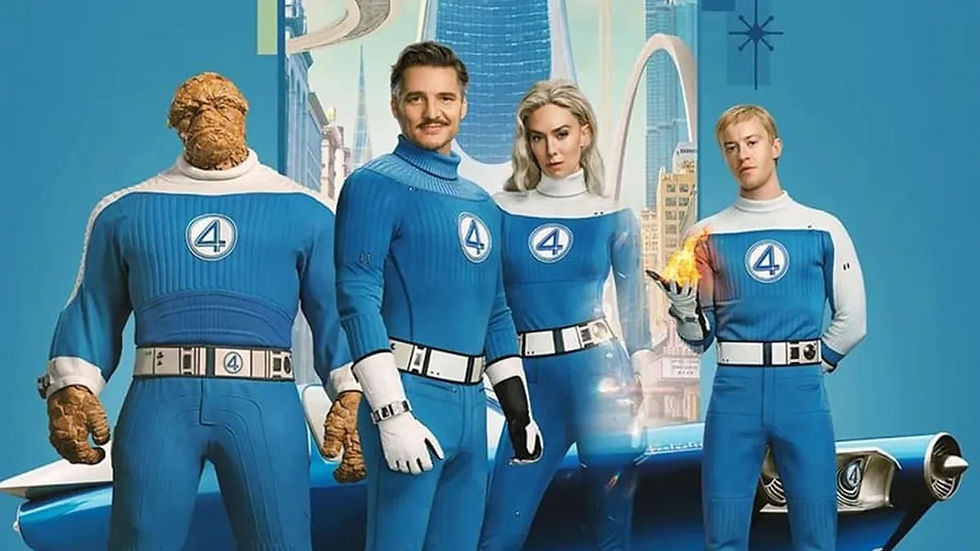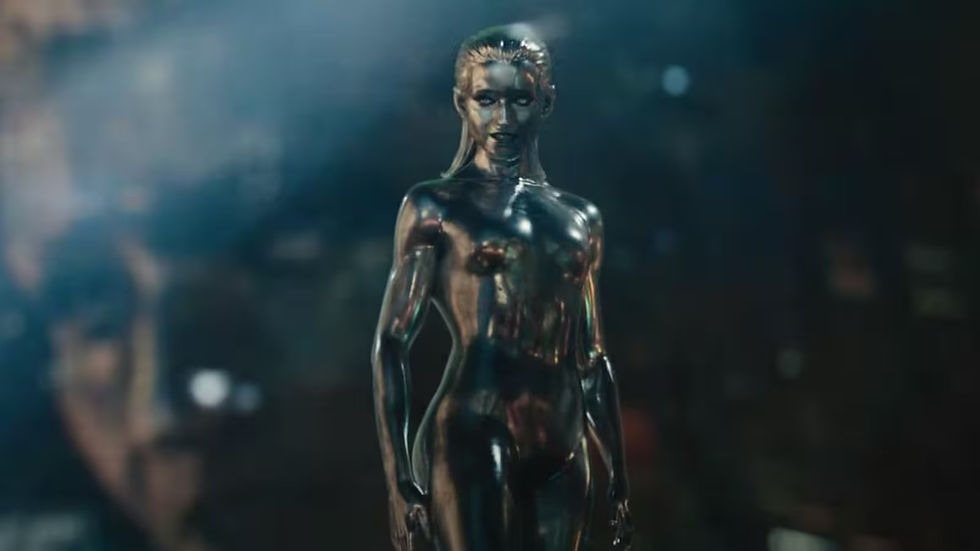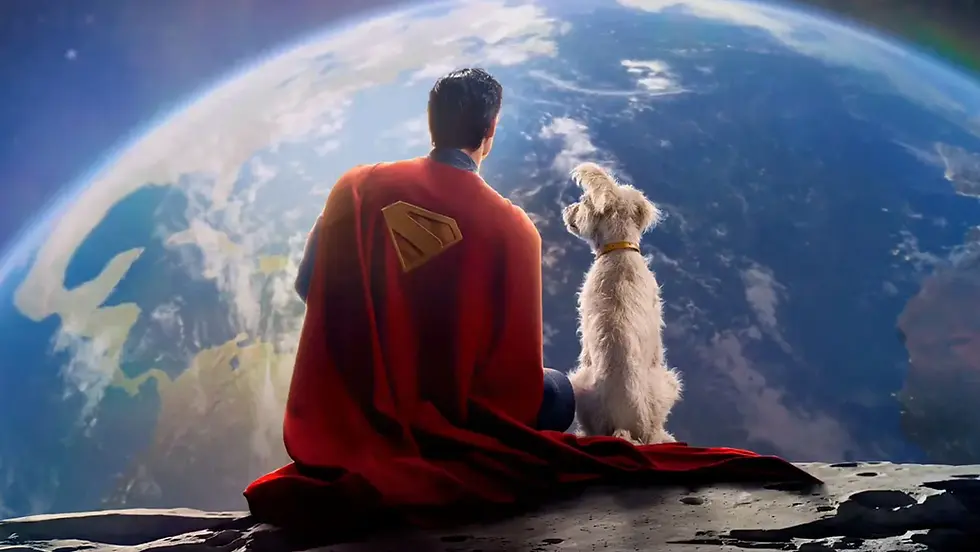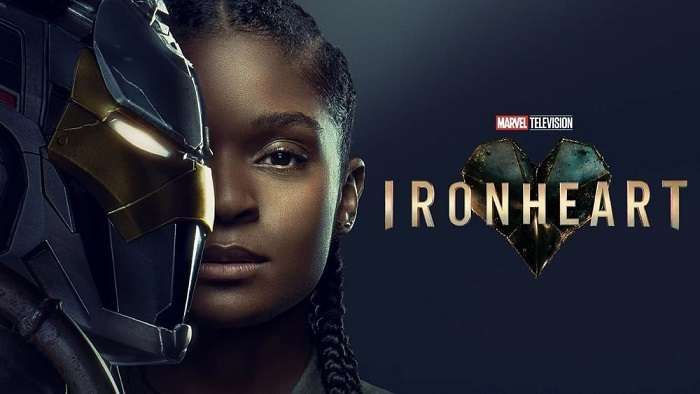Fantastic Four: First Steps Review
- Eris Grey

- Jul 25, 2025
- 6 min read
Phase 6 has begun in the same vein as Phase 1: world-building. Without leaving behind the complexities and nuances of Phase 1-5, Fantastic Four: First Steps was able to introduce a new world, new characters and heroes while still maintaining the overall feel of the Marvel Cinematic Universe.
The writers, Josh Friedman, Eric Pearson, Jeff Kaplan, Ian Springer and director Matt Shakman, do not waste our time with an origin story (much aligned with James Gunn's Superman), saving us from the grim "these are my powers, but at what cost?" sequences that squander film time. We have their headquarters; they've worked together, and they've defeated villains and infrastructure, building a narrative as a family, both in a literal and figurative sense. Familial tension, shared grief and triumphs, frustrations, inside jokes and loyalty that's earned.

Pedro Pascal's skill set aside, this is the best cinematic take I've seen on Reed Richards. A man with intense intelligence and moral depth, Pascal plays Reed without grandiosity. He's less of an obsessive genius and more of a man burdened with great intelligence, with the near implication that he wishes he could control the thoughts that strain his mind and keep him up at night. The intellect is not preformative, it's carried with grief and hardship with every decision, every calculation and admittedly, in every intrusive thought he has. Pedro Pascal plays Reed Richard as a man who's not out to prove anything. He's just trying to hold it all together - the world, his team, his love for Sue and impending fatherhood - something no amount of calculations can prepare you for. Sue Storm is brilliantly played by Vanessa Kirby, and she commands the screen with an emotionally layered, poised fierceness that is more unflinchingly honest than most women in Superhero roles are allowed to be. An emotional backbone for the team, she's soft without being weak, feminine without her strength being undermined, and it's wonderful to see. Joseph Quinn plays Johnny Storm with a stoic sense of wit, no longer the frat-boy version of the character; he gets to embody intelligence, have an emotional compass, and play Storm with the same sensitivity that won people over in The Stranger Things. Johnny Storm wants to matter; he wants his work to be recognized; he wants to help his team and not be sidelined. Finally, for the Fantastic Four team, Ebon Moss-Bachrach delivers a performance that is both hopeful and deeply sad. An exhausted, lonely man who just wants to help the world, who, for good reason, has insecurities in the way he looks that hold a deep sympathy behind his eyes. He is full of love, a wonderful friend, full of humanity in the way he makes children laugh, and his emotional intelligence makes him endearing, which he sees in pieces with the way he holds Reeds and Storms baby, and his budding relationship with Rachel Rozman, played by Natasha Lyonne - a woman so well versed in acting, her small role became instantly memorable and truthfully, adorable.
Without getting into how fantastic (pun intended) Ralph Ineson was as Galactus, the shine must be gleamed on Julia Garner and her incredible performance as Shalla-Bal. The sheer intensity she plays the character is near cosmic.

"I herald his beginning. I herald your end. I herald...Galactus."
Cold. Luminous and emotionally layered. I will admit that I was not a huge Julia Garner fan until this role, the last one being The Wolf Man...which I am not willing to talk about, but her presence as Shalla-Bal feels ancient without her needing to be so. There is no questioning her power, her strength, her durability and the effort she puts in for Galactus, and then eventually the underlying reason shows why we can feel the weight of time behind her eyes. What's brilliant about her portrayal of the role is that the film does not reduce her exposition to mystique. Her role is not a reference point for Fantastic Four fans; her part is huge for the narrative and architecture of the story. It's own glue that not only expands the world, but also challenges those within it to work harder - namely, Johnny Storm.
Galactus has been many things in Marvel Comics. A planet eater, cosmic god, but this was the first time - for me - that he felt physical. Ralph Ineson voices Galactus with a gravelly, low voice that is much calmer than a creature shouting into the void. He speaks as if gravity is falling out of him; every word he says feels final, every pronunciation feels ancient. He does not eat planets because he is evil, or because he has malice, but because he is cursed with insatiable hunger. Visually, Galactus could have been bigger. A cosmic being that eats planets should be able to have the scale of New York City be nothing more than a footprint, understandably so; they could not go in that direction, both plot-wise and because something that large is near inconceivable to the human mind.
Fantastic Four: First Steps is an incredibly well-shot film with Jess Hall at the helm of the cinematography. Aligned with the costuming and set design that mirrors our 50s, but with an updated landscape of today's world. It's elegant, without intentional control over colouring and framing that echoes the messaging in the movie. The scale is immeasurable, and as the world gets bigger, you can feel it. You can feel Galactus's ship looming. The camera lingers just long enough to feel the emotional connectivity and what is at risk for the civilization. The set design is grounded: the Baxter building feels real, it's lived in, but it also honours the characters' identities. It truly feels like a headquarters that has been built like a home, which I feel will be an important distinction between The Fantastic Four and the Avengers, or rather, the Avengerz.

When Fantastic Four arrives in space, it truly feels otherworldly. The visuals are dark, elemental and even wide shots felt suffocating. The action scenes have clarity, feel realistic with a surprising emotional undercurrent of being human, but not quite. That writing, plus the cinematography with it, worked brilliantly together.
I love the score for Fantastic Four. It has a certain nostalgic theme and beat to it that references a different era of comic books and graphic novels. It changes throughout each character, with emotion through Ben and subtle strings with Reed. Galactus' score feels nearly absent; there's no insert villain music here when it comes to his screen time. It feels off, huge, and terrifying.
At the core of the movie, First Steps is more than a film about human extinction and the survival of civilization. It's a beat for the family you choose, and a portrait that some things are bigger than the differences in cultures and identity. There's no heroism as a spectacle. There's family, and the intricacies of each family member bring a different piece forward that anchors them all together. It's not about sacrifice - we can all make those for the greater good. It's about choice, the difficulties in making them, and how we all need to come together to evoke change. To choose one another. Even in times that are terrifying. Telling, isn't it?
The Marvel Cinematic Universe in phases one through five prioritized spectacle. There was plenty of heart in the films, but not much intimacy. Thunderbolts* ended that trope this year, and Fantastic Four carries us into a new wave of survival being worth the fight.
We've had variant multiverses, world-ending portals, timelines collapsing and stacking onto one another, heroes blending, and universes colliding. Cities levelled, skies torn open, and gods falling from them. Fantastic Four: First Steps does not try and top that. Now we have a new beginning. Something that feels fresh, grounded, with heroism that doesn't need to prove itself.
5/5
FAQ: Fantastic Four: First Steps
Is Fantastic Four: First Steps an origin story? Not exactly. We’re not watching them get their powers or form the team from scratch. Instead, the film drops us into their world already established—as heroes, as a family, and as public figures—while weaving in pieces of their history with purpose and care.
Do I need to have seen previous Marvel films to understand this? Nope. This is a fresh start. If you’ve followed the MCU, there are subtle connections, but this stands completely on its own. New viewers won’t feel lost; longtime fans will just pick up a few extra threads.
Is Galactus actually in the movie? Yes, and he’s handled with weight and mystery. Ralph Ineson brings a terrifying stillness to the role, and the film avoids overexposure in a way that keeps the scale of Galactus properly mythic.
Is this a fun movie, or more serious in tone? It strikes a balance. There’s levity. Especially from Johnny, but this is more mature, more restrained than past MCU entries. It leans into wonder, isolation, and cosmic awe rather than nonstop banter.
Is the cast good? The cast is excellent. Pedro Pascal plays Reed with surprising warmth beneath the intellect. Vanessa Kirby’s Sue is quietly commanding. Joseph Quinn’s Johnny is a highlight: restless, vulnerable, and fully alive. And Ebon Moss-Bachrach as Ben Grimm? Perfectly human, even under the rock.
Are there end credit scenes? Absolutely. The first one is important. The second one is fun.




Thank you for putting into words what I just experienced. Michael Giaccino is a next level film composer, on par with Hans Zimmer and James Horner. Can’t wait to see it again to catch the nuances I missed with a sound mix that wasn’t great at my theater. (Sound FX overpowering dialogue)